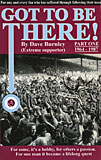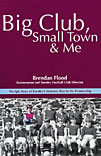 Got To Be There
Got To Be There
Part One 1964-1987
by Dave Burnley
Dawber, £10.00
Reviewed by Alan Tomlinson
From WSC 274 December 2009
 Big Club, Small Town & Me
Big Club, Small Town & Me
The epic story of Burnley’s meteoric rise to the Premiership
by Brendan Flood with Stuart Wilkin
TH Media, £9.99
Reviewed by Alan Tomlinson
From WSC 274 December 2009
Before and on October 18, 2009, the UK’s sport media focused upon what some called the “cotton-town derby” – Blackburn Rovers versus Burnley – that would establish “bragging rights” in east Lancashire. The two clubs were founder members of the Football League in 1888, but had not met in a top-flight fixture for over 40 years. It was an eerie atmosphere walking to Ewood Park from Lower Darwen, as the blue-and-white of Blackburn dominated the streets, one shirt announcing “Burnley fans eat bananas with their feet”. The 2,800 Burnley supporters were bussed in with a police escort. During this 11-mile journey passengers were abused from the windows of respectable Blackburn residences. On arrival buses were cordoned off by lines of police, preventing any contact with the visiting supporters. “How many of you are on duty for this?” I asked a young policewoman. “All of us… They’ve cancelled everyone’s day off.”
XHow did local derbies come to this? Burnley’s promotion to the Premier League after a 33-year absence sparked the publication of “extreme supporter” Dave Burnley’s first volume of his account of 43 years as a fan, and of businessman/club director Brendan Flood’s two and a half years as financial backer and operations director of the club. Flood recalls his early fandom, cataloguing the same highs and lows as experienced by Dave Burnley: the sale of star players in the 1960s and 70s, relegation from the top tier in 1971, the Leppings Lane End at the Burnley v Newcastle 1974 FA Cup semi-final 15 years before the Hillsborough tragedy, the last day of the season win in 1987 that ensured the club would not slide out of the Football League. Both books secured backcover endorsements by Alastair Campbell, a populist spin-doctor alert to the importance of both the fanatics on the terrace and risktakers in the boardroom. But as Flood’s banking career and business empire Modus grew, he graduated from the Longside of Burnley’s Turf Moor to the respectability of the Bob Lord Stand. Dave Burnley stayed put, achieving his extraordinary record of missing no competitive game by his adopted club for over a third of a century.
Born Dave Beeston but known as Willie at school (after Burnley’s Willie Irvine) and Ralphy (after Burnley’s Ralph Coates) in his home village, this self-confessed extremist changed his name to Burnley by deed poll in April 1976. His accounts of the ruses and strategies vital to his “love” for the club are startling and amusing in turn, though elongated accounts of vomit-sessions, and overused alliterative phraseology, might have been edited out by his mentors at the Keele University creative writing school. For the most part, though, Burnley writes with passion, clarity and eloquence, citing Martin Luther King in contextualising the Ewood Riots of April 1983, when 31 Burnley supporters were acquitted of charges trumped up by the Blackburn/Darwen police.
There’s a lot in Flood’s book on money matters and transfers in recent years and hardly a mention of Blackburn. Directors come and go and the collapse of Flood’s Modus Ventures (with £4.5 billion worth of stalled or collapsed retail development) may have jeopardised his saviour status. Whatever, Dave Burnley will be at the next match – police escort or not, Blackburn or whoever – on bus, train, foot and bike, regardless of the global economic crisis.